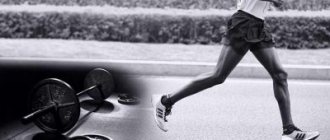With a weak warm-up
If a person warmed up weakly, did not do warm-up exercises, and then ran, he will have weak blood flow, which will change to intense during jogging.
The internal organs will fill with blood and stretch, causing pain in the side. When a person is calm, only 30-35% of his blood flow passes through the internal organs.
https://www.youtube.com/watch?v=BzXPvc-Fb0g
But as soon as you give yourself an increased load, the blood suddenly moves to the liver, spleen, and kidneys, circulating through them. The capsules of these organs contain many nerve endings that react strongly to blood pressure.
This is one of the most common causes of pain when running.
Risk groups: inexperienced athletes (beginners), teenagers, untrained people, and such pain in the side is typical even for those who do not suffer from diseases and do not smoke.
Training, warming up the body before running (gradually), from this the muscle tissue of the organs will also warm up and will not hurt when stretched, there is no need to start running with sudden movements - and the pain in the side will be gone.
Causes of headaches after running
Behavioral reasons
Behavioral reactions of the body that cause imbalance are often called benign positional vertigo. The organs responsible for balance are: the inner ear, organs of vision, receptors of the skin, muscles and tendons.
All movements that a person makes are instantly assessed by the vestibular apparatus. Any rotation of the body is analyzed by semicircular channels filled with liquid.
Surface pressure on the skin of the foot, as well as muscle load, informs the body about the nature and strength of gravity. The organs of vision analyze the dynamics of changes in body position, as well as acceleration relative to other objects and objects located around.
Doctors have identified several reasons that can lead to discomfort after playing sports. These include:
- The presence of osteochondrosis in a person. Any physical activity is stressful for the human body, especially if a person has not exercised for a long time. In this case, a large flow of blood enters the muscles and they warm up. During exercise on the treadmill, the neck muscles also begin to actively work, and if a person has osteochondrosis, especially in the cervical region, then after exercise he may experience headaches and feel sick;
- The presence of calcium salts in large quantities in the body. They can accumulate in tissues and put pressure on the vertebral arteries. As a result of exercising on a treadmill, the load on the body increases, and it begins to circulate blood faster through the internal organs. As a result of this, the cardiac system also begins to work faster and increases pressure on the internal walls of blood vessels and nerve fibers;
- A person has high blood pressure in everyday life. Most often, if a person has such a problem, and he additionally exercises on a treadmill, then after training he will have pain in the back of his head and his nose will bleed. The person feels nauseous and may vomit;
- The presence of arteriosclerosis in a person. It leads to dull pain in the back of the head and forehead;
- The presence of sinusitis, sinusitis and rhinitis in a person. They contribute to the appearance of acute pain in the frontal region. Doctors strongly recommend that you avoid any physical activity if you have these diseases. You should also avoid training if you have otitis media;
- Long-term use of potent drugs and antibiotics by a person;
- If there are problems in the nervous, cardiac and circulatory systems. Usually, with diseases in these systems, a person experiences throbbing pain and feels sick;
- When a person develops vegetative-vascular dystonia;
- In the presence of injuries and inflammation in the brain area, as well as consequences after them.
What to do if you experience pain while running?
Do not stop right away - this will increase the load on the heart and other internal organs due to a sharp change in blood flow. Take a step first, and when you feel better, you can run again. After switching to a step, you can do several exercises: swing your arms, bend back and forth - to the sides. This way you will reduce the load on your internal organs and give them the opportunity to rebuild.
If the pain does not stop, press your palm onto the part of the body that hurts and rub a little.
If a sharp and severe pain in the side does not go away, no matter what you do, call an ambulance immediately - this may lead to a rupture of the spleen.
Improper breathing
What could be wrong breathing? Sharp, strong, deep or, conversely, superficial and sluggish. In one case, too much oxygen enters the body, in the other - not enough to ensure the good functioning of all internal organs.
If very little oxygen, and with it nutrients, enters the diaphragm muscle, which controls the breathing process, the muscle spasms and the person has pain in the stomach - its upper part.
At the same time, the liver is deprived of oxygen, as a result of which the blood flow in its area becomes weaker, the blood stagnates, and the liver is forced to swell, increase in volume, and intensify its work, because there is much more blood in it.
Cool down and stretch
When running, blood flow increases in the loaded muscles, so it is very important to ensure a smooth change in blood circulation at the end of the run.
To do this, each run must be completed with a cool-down - a kilometer and a half of light jogging or a couple of laps on foot around the stadium. Cooling down helps the body return to a “normal” state, gradually slowing down the breathing rate and pulse, and normalizing blood microcirculation.
After your cool-down, it's time to do some post-run stretching. Here, special attention is paid to large muscles such as quadriceps, hamstrings, calves and glutes, chest and back.
Well, then, as we already said, have a good meal!
This is an adaptation and translation of material published in Runners' World magazine. Yulia Shigorina for the translation .
Have you eaten recently
You can't eat before running. In general, before physical activity, avoid having a heavy breakfast, lunch or dinner - this will only harm you and make you drowsy, rather than have the strength to run.
It deals with the digestion process.
At this time, the stomach becomes larger, it processes the food that has entered it. The liver vessels also increase in volume because the liver needs more blood to work, more power to separate toxins from nutrients and neutralize toxins.
Effect of nutrition on gastric function
If a person has impaired functioning of internal organs, for example, the stomach, liver, spleen, pancreas, then when running they will experience additional stress and get very sick. Pain when running is usually localized in the right or left side or in the middle of the abdomen.
Content
Most of us have no time to take care of our health. For some reason, it seems to us that diseases cannot touch us.
At the slightest manifestation of the symptoms described above, we should consult a doctor, because we cannot determine what exactly we are sick with, just as we cannot be sure which medicine will help us. Self-medication not only does not heal, but can also cause quite a lot of harm.
This disease is popularly called gastric neurosis; doctors classify it as functional dyspepsia. It can be acquired due to recent stress, nervous or mental strain, mental trauma, or poor nutrition. Sometimes a cup of strong coffee, a cigarette smoked on an empty stomach, or a glass of alcohol can provoke dyspepsia.
The concept of psychosomatic disorder has long been known to doctors. It refers to a situation where mental trauma caused by stress does not manifest itself in the behavior and thinking of the patient, but takes on the form of certain diseases. Hence - strokes, heart attacks and stomach ulcers.
Pressure drop
The top three causes of poor health after running include hypotension. This is indicated by dizziness in the head after standing up abruptly.
The pathology is most likely provoked by frequent, debilitating stress, chronic lack of sleep or poor nutrition.
It is not uncommon to feel nauseous after running due to the high speed. The post-workout condition is caused by excessive stress.
Indisputable evidence of exhaustion of the body are: problematic breathing, pulsation in the head, tachycardia more than 170 beats, problems with coordination.
To avoid such problems, it is important to take care of smooth loads. They need to be increased only gradually.
For beginners, it is preferable to use alternating exercises: running and walking. The optimal running intensity is when you have free breathing and the ability to speak.
If an episode of nausea occurs while running, it is forbidden to stop. You need to gradually switch to walking.
Otherwise, it will only make you feel worse. It's good to breathe deeply. If nausea persists, it is important to stop training.
In such cases, it is extremely important to properly organize your work routine. You need to allocate at least 8 hours for sleep.
If this value is less than 6 hours, classes should not be conducted at all. It is better to rest more during such periods rather than exhaust an already tired body.
Why does nausea occur? An important factor is dehydration of the body. This situation often occurs during intense, long-term training.
Dehydration causes severe nausea. Moreover, during exercise, due to high loads and internal overheating of the body, heat stroke is possible.
It has been proven that you need to come to training in a great mood and feeling good. So, pain in the head, malaise, weakness during exercise will only get worse.
Why do I feel dizzy for several days, what can I do about it?
Every person by nature has the ability to maintain their health and life. Running has many benefits. Thanks to it, you can strengthen the ligamentous and muscular apparatus, joints.
During jogging, blood circulation increases, and organs and tissues are better saturated with oxygen. This prevents the heart and vascular system. However, there are times when you feel dizzy after running. Therefore, problems need to be kept to a minimum.
Deterioration of the condition, with signs of dizziness, occurs with a lack of oxygen in the body, signs of a cold, or an imbalance in strength. It is necessary to accurately determine the true cause of your dizziness.
Why might you feel dizzy after running?
This happens in untrained people.
Main reasons:
Behavioral response
When your head starts to feel dizzy, it is a consequence of a behavioral reaction. The eyes, ears, muscles and tendons and skin are responsible for all actions.
Physiological reaction
Blood flow is formed depending on the position of the body. The feeling of spinning comes from a lack of oxygen in the brain or heart. Possible loss of balance due to problems of the vestibular system.
The reason for hiding is this:
- a tumor was discovered in the cerebellum;
- the pressure changes sharply, up and down.
Symptoms of dizziness while jogging
There are four types of symptoms:
- Before your eyes, an object moves in one direction.
- Feeling of spinning inside the head. It's impossible to describe it exactly.
- Loss of consciousness seems to be approaching.
- The man says that something is wrong with him.
How to avoid dizziness after a run?
- You need to start with small runs at a calm pace for 10 minutes.
- Increase your training, slowly listening to your body, choosing the best pace and distance.
- Daily loads should not exceed 15 km for women and 20 km for men. At first, you can run up to 7 km.
- Eat well, but don't overeat.
- Monitor your blood pressure.
- Avoid heat stroke.
- Do the exercises correctly while running.
- Observe breathing technique.
- After running, you don't need to stop, just walk around for a couple of minutes.
- In case of serious deviations, change walking to running at a distance of two or three kilometers.
Extend this to three weeks. - When running in the evening, be aware that your body gets tired. If you haven't eaten during the day, or it's humid outside from jogging, you feel bad.
- It is important that there is a sufficient amount of glycogen in the blood.
This substance is fuel for muscles. For experienced runners, it is enough for a distance of 30 kilometers if he runs fast. An ordinary person has enough for 5 km.
Methods for diagnosing dizziness
Some people think that dizziness cannot be treated. This is wrong. First you need to undergo an examination.
Check the function of these organs:
- The vestibular apparatus is responsible for movement. Its function is to analyze the fluid that fills the semicircular channels as soon as the body turns. When muscles are under load, the body receives a signal about the force of gravity towards the earth.
- Visual receptors control body position. It is they who accelerate or reduce the perception of movement or being at rest of objects located next to us.
- Receptors in the skin and muscles transmit a signal to the brain. When running speeds up, these changes are not immediately noticed.
It is advisable to conduct several examinations to establish an accurate diagnosis.
These types of examinations will give good results:
- Carrying out tests using computer or videography equipment that record eye movements and reactions.
- Hearing function test.
- Check the blood vessels, brain, endocrine system on a tomograph.
- Study of biochemical blood analysis, etc.
Treatment for dizziness after running
Periodically in the fall and spring you need to strengthen your blood vessels. IVs, physiotherapy, acupuncture and a visit to a chiropractor who will give the right massage will help with this.
To normalize cerebral circulation, use medications prescribed by your doctor. They allow you to saturate the brain with oxygen and improve the functioning of the vestibular apparatus. This will improve the balance of the body, restore attention, memory, and your head will not feel dizzy.
In some cases, rehabilitation programs and special exercises will help to restore all affected areas of the central nervous system.
If the reason lies in a vision problem, optical correction will be performed. If a cataract is detected, surgical treatment to replace the lens of the eye is proposed.
Traditional methods
- Vasodilating herbs are suitable. A decoction of valerian, hawthorn, hazel, parsnips, chamomile, etc.
- Preventive cleaning of blood vessels.
Collection of herbs. Motherwort, hawthorn, eucalyptus, peony, valerian, mint leaves.
There are quite a few recipes, so choose what suits you.
You should not treat yourself; it is better to consult a doctor or call an ambulance.
If you feel sick after the gym
Pause your workouts at the gym to avoid making the situation worse. Lie down and drink some water. Regulated breathing will help correct the situation. Take the first deep breath before the exercise, and take subsequent breaths in the upper region. Exhale as much as possible until your pelvis rises. Do not hold your breath to avoid loss of consciousness.
Before loading, the athlete must warm up properly. It will help disperse blood throughout the body and warm up the muscles. Change your daily routine and diet.
Required conditions:
- full and healthy sleep 8 hours;
- include carbohydrates, vegetables and fruits in the diet;
- on sports days you cannot eat fried or smoked meat;
- start training two hours after eating;
- when exercising, consume natural chocolate in moderate doses – it will add energy and tone;
- consume low-fat dairy products.
By following simple rules, you will be able to forget about nausea and vomiting and enjoy the process of training for the benefit of your health. Going to the gym is a healthy habit. During physical activity, the muscular core of the body is strengthened, both external and internal muscles are trained, blood flow increases, and cells are saturated with oxygen. With the help of sports you can lose excess weight.
Carry out loads in moderation. The trainer selects an individual exercise system and the appropriate load. In case of problems of various nature with health and deterioration of well-being during or after training, it speaks of an incorrectly selected, set program of exercises and activities. Reduce the load.
It’s easy to overtrain in the gym and you’ll feel nauseous. Men are susceptible to this consequence. Guys dream of a pumped up body with definition, they try to lift weights and increase the load as much as possible. A stress hormone is produced that causes vomiting. You need to exercise up to four times a week.
Eating food before training causes urges, long-term eating (5-6 hours before training) causes oxygen starvation of cells, rumbling in the stomach, and nausea. When dizziness occurs, nausea and pain occur. Sports fans work and don’t have time to satisfy their hunger. A protein shake will reduce the risk of nausea. Drink it an hour before training. Protein will be quickly absorbed and will not cause discomfort.
Breathing is important during training. Improper inhalation and exhalation causes migraines, weakness, and the urge to vomit. Completely review your training technique. You will have more strength and endurance, and your workouts will be enjoyable. Medicines cause side effects such as vomiting. During training, the heart works hard and performs a serious, difficult function. The vessels dilate. After training, the heart rate normalizes, the blood vessels do not decrease in size. Nausea and dizziness occur.
Medication relief from headaches
Many people claim that a lemon compress will help get rid of headaches. To prepare it, you need to grind the pulp of one lemon and put it on a towel. The towel should be placed on the forehead.
The easiest way to get rid of nausea or headaches directly in the gym would be the following options:
- Lie down with your head in a position higher than your heart. This will constrict the blood vessels, and the unpleasant sensation will pass very quickly.
- The second way to restore normalcy is to have a snack with something quickly digestible. An excellent option would be an apple or banana. These high-carbohydrate foods will replenish decreased glycogen stores, and the discomfort should go away.
Why do you feel nauseous after training? Another reason may be a simple lack of potassium and magnesium in the body. Take vitamins, preferably complex ones, for 2-3 months.
However, there is reason to worry if nausea and migraines become something familiar and regular after physical activity. In this case, the answer to the question of why you feel sick after training will be a recommendation to consult a doctor. There is a risk that you have a cardiovascular disease.
How to determine: is it a behavioral reaction of the body or physiology?
A short-term imbalance in conditions of changing load on the body indicates a physiological reaction. Under normal conditions, oxygen is transported through the bloodstream from the lungs, and carbon dioxide comes back from the tissues. Under conditions of prolonged excess oxygen, it binds to hemoglobin.
There is no longer enough free hemoglobin to remove carbon dioxide, which leads to tissue poisoning with carbon dioxide. But in conditions of insufficient oxygen supply to organs, hypoxia occurs. For an untrained person, these factors can lead to dizziness, nausea and even loss of consciousness. With consistent training, many physiological negative effects will decrease over time.
A short-term imbalance in the absence of dynamics (static state of the body) during physical activity indicates a behavioral reaction of the body. This indirectly indicates the imperfection of the vestibular apparatus. Exercise and running help train the vestibular system, minimizing the negative effects.
In most cases, there is no need to see a doctor. The physiological and behavioral reaction of the body that causes dizziness is short-term in nature.
Why do you feel nauseous?
Why do people feel dizzy during physical activity? This is the most common question that people ask the trainer after their first lessons.
This is usually due to unfamiliarity, overheating or exercising in a stuffy room, but there can be other reasons: caused by illness or an incorrect approach to physical exercise. It often happens that a sports fan or professional athlete notices a severe headache after training. So why do you feel dizzy and nauseous after running? This is a question that people involved in sports ask. Many may feel weak, dizzy, and some may even lose consciousness.
When exercising on a treadmill, the load can be increased by increasing the speed and incline of the device. If a person has set himself a more difficult regime, but feels that he cannot cope with them, then the load needs to be reduced.
Many experts recommend switching to the “hill running” mode, which involves raising the running surface. This mode helps to tense various muscle groups, including those that are not involved in regular training.
They also help a person better maintain balance, train the endurance of the cardiac system and increase lung capacity. When exercising, a person needs to combine different types of load and types of physical activity.
Hypertension
We figured out the reasons that can cause headaches and nausea during strength training. But what if you go to the gym for a treadmill workout? How then can you explain the discomfort after class?
Dehydration
Another serious factor can be dehydration, which begins after heavy sweating and increased body temperature. Why do you feel nauseous and dizzy after running?
Our body consists of 80% water, so any reason that reduces this amount of fluid leads to a person feeling sick after running or playing other sports. Sweat, which occurs due to increased body temperature, carries with it not only toxins and other harmful substances, but also valuable moisture for the body.
Therefore, during serious competitions, Olympics and training with heavy loads, experienced athletes always drink water or a special saline solution that helps maintain the required fluid level. Otherwise, overload will not only make you feel sick, but your blood pressure will also increase.
The activity of removing water from the body depends on many factors:
- athlete's body temperature;
- the clothes he wears to train;
- ambient temperature;
- degree of load, as well as type of training.
It is important not to bring yourself to a state of dehydration, since in this case the athlete, in addition to feeling sick after running, loses coordination of movements, experiences a serious loss of strength and even loss of consciousness.
Beginning of a viral infection
When pathogenic bacteria appear in our body, the immune system tries with all its might to defeat them and prevent the virus from spreading. However, the immune system cannot always cope on its own, so the onset of a viral infection can also lead to the athlete feeling sick after running.
Here, as in the case of overeating, the body throws all its defenses at fighting the problem, not taking into account that the athlete is training, and his muscles also need a large amount of energy.
Opinions on whether to continue training in this state are mixed. Many athletes believe that this way they will be able to defeat the disease faster, since not only toxins, but also all microbes come out with sweat. And some, on the contrary, are sure that by training hard, you can only aggravate your condition and prolong the course of the disease, turning a common cold into a severe flu with serious consequences, for example, pneumonia.
In any case, you need to listen to yourself, and if you feel nauseous after running, dizziness and a complete loss of strength accompanying ARVI appear, then you should not train “to the point of exhaustion.” Sports records are here to stay, and they need to be set in a healthy state.
Excesses in meals
According to the rules, it is not advisable to overeat before training. Excessive stress on the stomach an hour before intense exercise will certainly provoke nausea. Why does this happen?
Moreover, this kind of diet causes significant harm to the structures of the gastrointestinal tract.
Due to oxygen starvation and dynamic stress, the stomach cleanses food worse: toxins and microbes can easily enter the blood, which only aggravates the condition.
The condition can be avoided. At least an hour and a half should pass after the last meal. Only then can you move on to classes.
It is also important that easily digestible dishes predominate in the diet: such a solution will not only empty the stomach faster, but will also give a boost of energy for training.
It is better to give preference to buckwheat, vegetables and fruits, and boiled meat dishes.
It is forbidden to eat a lot. Normally, you need to get up from the table with a slight feeling of hunger. If you wish, half an hour before training, you can allow yourself a banana or a handful of your favorite nuts. You are allowed to drink coffee, but without sugar.
Dehydration reduces results
Studies on the effects of dehydration in competitive sports have shown that for every percentage point of weight loss from dehydration, you are 2% slower.
For example, if an athlete weighs 56 kg and sweats about 1.3 kg per hour, in two hours she will lose 2.6 kg, which is about 5% of her body weight. This 5% worsens her performance by 10%, and if before that she could run 2 km in 10 minutes, after two hours of running her performance will deteriorate by 1.2 minutes.
Of course, you can replenish the water supply, but the losses will still be too great and the indicators will deteriorate by a certain percentage.
Lack of sleep
Nausea after running, as a rule, is a one-time occurrence if a person does not get enough sleep. The body has used up all its resources even before the start of the workout. Remember: sport should be beneficial. Exercise gives a healthy body a feeling of pleasant fatigue and lightness, enriching it with oxygen and helping muscles grow and develop.
In the case of a specific lack of sleep, for example, if you slept less than 7 hours or were under stress, suffered from insomnia, etc., the exhausted body will fight with all its might. In addition, an appropriate signal will be given - you will start to feel sick after running. Such training will not lead to progress; it will only aggravate the critical condition and may result in health problems in the future.
High running speed
Too much load and high speed also lead to the athlete feeling sick after running. The reason here lies in a decrease in blood sugar levels, a disease such as glycemia develops. Glycogens are substances that store glucose, which the body needs to obtain energy.
As the speed increases and, accordingly, the load of glycogen increases, the amount of glycogen becomes smaller, an acute shortage is felt, and as a result, nausea and dizziness occur. In severe cases, sudden increases in running speed can cause muscle wasting and even cramps.










